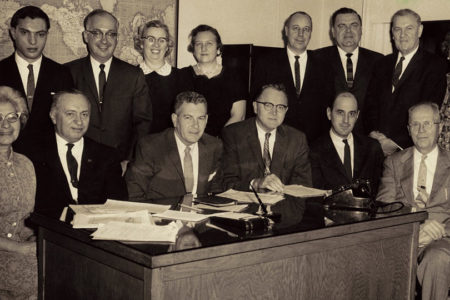The Preeminent Christ
Hebrews 1:4–14
No chapter in the Bible presents such a full picture of the deity of Jesus Christ as Hebrews 1. After completing His earthly ministry, Christ was restored to the dignity and glory He possessed in eternity past, being enthroned at God the Father’s right hand as Heir of all creation. Verses 1–3 present Christ as the authoritative Architect and Administrator of the universe, the one who carries the ages He created and all human history to its God-designed end.1 The remainder of the chapter declares Christ’s preeminence, contrasting His superior ministry to that of angels.
Christ’s Position
Verse 3 emphasizes the Son’s eternal relationship to the Father, whereas verse 4 presents Christ as the exalted Son of God: “Having become so much better than the angels, as He has by inheritance obtained a more excellent name than they” (v. 4).
The word inheritance denotes a past-completed fact with present-abiding results, showing that His possession of the inheritance is permanent. Angels are great and powerful; but none has an inheritance like that of Christ, the Son of God. His name, authority, power, and dominion far exceed that of any created angel (Phil. 2:9–11). And Christ’s position is greater than the angels’ in its identity, incarnation, and inheritance.
The author then used seven quotations from the Old Testament to convey the deity, sovereignty, and authority of Jesus Christ in contrast to angels, who are merely ministering spirits ready to do God’s will.
1. Psalm 2:7. This first reference presents the Son as Heir: “For to which of the angels did He ever say: ‘You are My Son, today I have begotten You’?” (Heb. 1:5).
This Psalm was originally sung at the coronation of a king, such as David or Solomon. The phrase I have begotten you does not refer to the Son’s origin of existence, eternal generation, or incarnation because there never was a time when the Son did not exist. Although Jesus Christ was always the eternal Son in relationship to God the Father, He was uniquely appointed and was declared at His resurrection to have the positional right to rule as the Son (cf. Acts 13:33–34). This was never said of any angel.
2. 2 Samuel 7:14. The second reference comes from 2 Samuel, where God presents the Son as the one who fulfills the covenant made with King David: “I will be to Him a Father, and He shall be to Me a Son” (Heb. 1:5). While this text has a primary reference to David’s son Solomon, its greater and final fulfillment is in Christ. Solomon’s kingdom was not established but divided, whereas Jesus Christ’s Kingdom will be established eternally. It is clear that David’s greater Son, Jesus Christ, is the one who fulfilled all the Messianic promises of redemption and will fulfill the Millennial Kingdom blessings in the future.
3. Deuteronomy 32:43; Psalm 97:7. “But when He again brings the firstborn into the world, He says: ‘Let all the angels of God worship Him’” (v. 6). This reference is from Deuteronomy 32:43 and Psalm 97:7 as quoted in the Septuagint, the ancient Greek translation of the Hebrew text. The word again points to a time when all angels will worship Him, demonstrating openly that they are inferior to the Son.
The phrase but when He again brings the firstborn into the world refers to Jesus’ Second Coming in judgment. The word for “firstborn” was also used by the apostle Paul in Colossians 1:15. It does not imply that Jesus was created by the Father because He has been coequal with the Father from eternity past. Rather, it speaks of Jesus’ existence prior to creation and His sovereignty over it. Thus Jesus is higher than angels because He created them.
Christ’s Preeminence
4. Psalm 104:4. “And of the angels He says: ‘Who makes His angels spirits and His ministers a flame of fire’” (Heb. 1:7). This quotation shows the place angels have in God’s divine administration throughout the universe. Christ is the one who created and commanded the service of angels, and they minister under Him to carry out His will and purposes.
The words spirits and fire define the nature of these created beings and describe their qualities and activities. The word spirits can also be translated “wind.” And like the wind, angels are invisible, powerful, and travel quickly.
The phrase a flame of fire refers to the angels’ brilliant brightness and appearance and implies they implement God’s divine judgment.
Even though angels occupy a high place of service in God’s economy, their position is still transitory and far inferior to that of Christ. He is superior to angels because they are subject to His authority and will.
5. Psalm 45:6–7. In this quotation the author affirmed the eternality, majesty, authority, and administration of the Son in God’s Kingdom. He also celebrated the Son’s status of righteousness in keeping with God’s holy character:
But to the Son He says: “Your throne, O God, is forever and ever; a scepter of righteousness is the scepter of Your kingdom. You have loved righteousness and hated lawlessness; therefore God, Your God, has anointed You with the oil of gladness more than Your companions” (Heb. 1:8–9).
These verses declare that Christ has a throne, whereas angels only minister around God’s throne. The phrase scepter of righteousness symbolizes Christ’s universal rule on His eternal throne; His reign is motivated by righteousness. Therefore, God has anointed the Lord Jesus and exalted Him above all His “companions.” That is, He was anointed with the Holy Spirit for His office of prophet, priest, and king when He entered His ministry.
Through this Old Testament quotation, the author declared five important truths about Jesus the Son: He is addressed as God by the Father; He is given an eternal throne and Kingdom; He reigns in righteousness; He hates lawlessness; and He is above all angels in His nature, character, eternality, majesty, authority, and rule.
Christ’s Power
6. Psalm 102:25–27. These verses were used to speak of God the Father in Psalm 102 but are used here to describe Christ’s unchangeableness, eternal power, majesty, and glory:
You, Lᴏʀᴅ, in the beginning laid the foundation of the earth, and the heavens are the work of Your hands. They will perish, but You remain; and they will all grow old like a garment; like a cloak You will fold them up, and they will be changed. But You are the same, and Your years will not fail (Heb. 1:10–12).
Christ was “in the beginning” and created the foundations of both heaven and Earth. This means He had to exist before the beginning. Thus Christ, who created all things, is eternal (Col. 1:16); but heaven and Earth are transitory.
Heaven and Earth are compared to an old garment or cloak that one day will be rolled up and discarded. The current heaven will pass away (Rev. 20:11); and the earth, with everything in it, will burn up (2 Pet. 3:10). Both are now deteriorating. All of creation is transitory and locked in a downward spiral of deterioration and eventual death.
Christ, however, is not transitory. He is eternal, immutable (unchangeable), and permanent: “Jesus Christ is the same yesterday, today, and forever” (Heb. 13:8). And in the future He will create a new heaven and Earth that also will be eternal. Therefore, Christ is superior to angels in nature, existence, power, immutability, destiny, and glory.
7. Psalm 110:1. “But to which of the angels has He ever said: ‘Sit at My right hand, till I make Your enemies Your footstool’?” (Heb. 1:13). These words were spoken exclusively to Christ the Son, never to angels. No angel was ever promised a seat at the Father’s right hand. The Father’s enthronement of Jesus Christ declares His acceptance of the Son and the Son’s ministry on Earth. Christ’s enthronement at the Father’s right hand foreshadows His enthronement on Earth when He will reign and rule on King David’s throne during the Millennial Kingdom (Lk. 1:32–33).
In the future, all Christ’s enemies will be put under His feet:
Therefore God also has highly exalted Him and given Him the name which is above every name, that at the name of Jesus every knee should bow, of those in heaven, and of those on earth, and of those under the earth, and that every tongue should confess that Jesus Christ is Lord, to the glory of God the Father (Phil. 2:9–11).
The Son is destined to rule the universe in the eternal state of the new heaven and Earth, for “He has on His robe and on His thigh a name written: KING OF KINGS AND LORD OF LORDS” (Rev. 19:16). This verse portrays Christ’s complete victory over His enemies. Everything will be put under His authority by God the Father (1 Cor. 15:22–28).
Hebrews 1:14 sums up the angels’ status and function compared to the Son: “Are they not all ministering spirits sent forth to minister for those who will inherit salvation?” When Christ’s work was finished, He sat down. On the other hand, the work of angels is not finished; they are God’s servants to minister to the heirs of redemption. Angels minister to believers by protecting them from evil, defending and delivering them from harm, and bestowing divine benefits on them. This truth should be a great encouragement to us during suffering and hardship.
The phrase who will inherit salvation has a present and future fulfillment. Although salvation encompasses regeneration in this life, it involves much more and will culminate with the reception of a glorified body.
No other chapter in the Bible presents such a full picture of the deity of Jesus Christ. He is called Son, Lord, and God. He is omniscient, omnipotent, immutable, and eternal. He is Creator, Sustainer, Redeemer, Ruler of the universe, and Heir of all things in heaven and Earth. He is worshiped by angels and all creatures that ever existed. Thus Jesus Christ is preeminent over the prophets and angels in His person and work. What more can be said but “to God be the glory!”
ENDNOTE
- J. Dwight Pentecost, Faith That Endures (Grand Rapids: Discovery House Publishers, 1992), 52.







